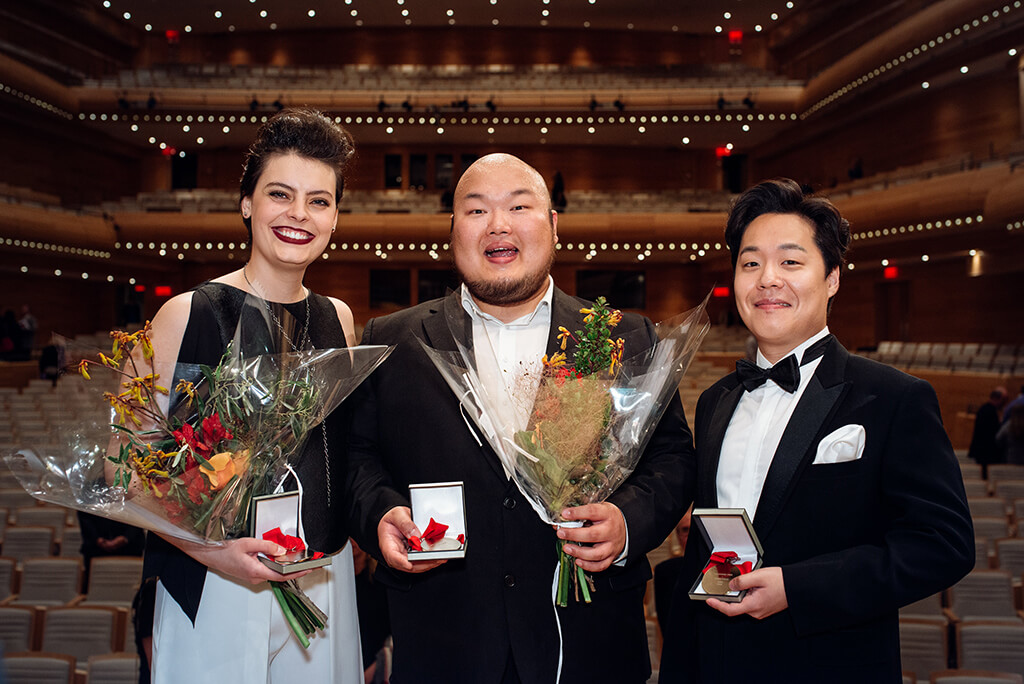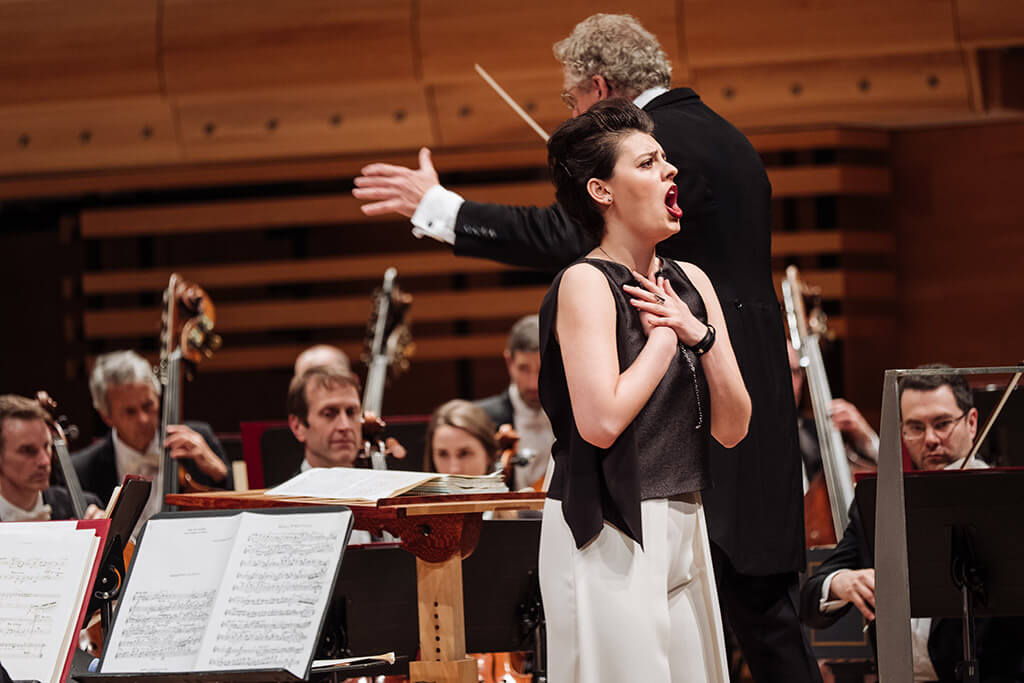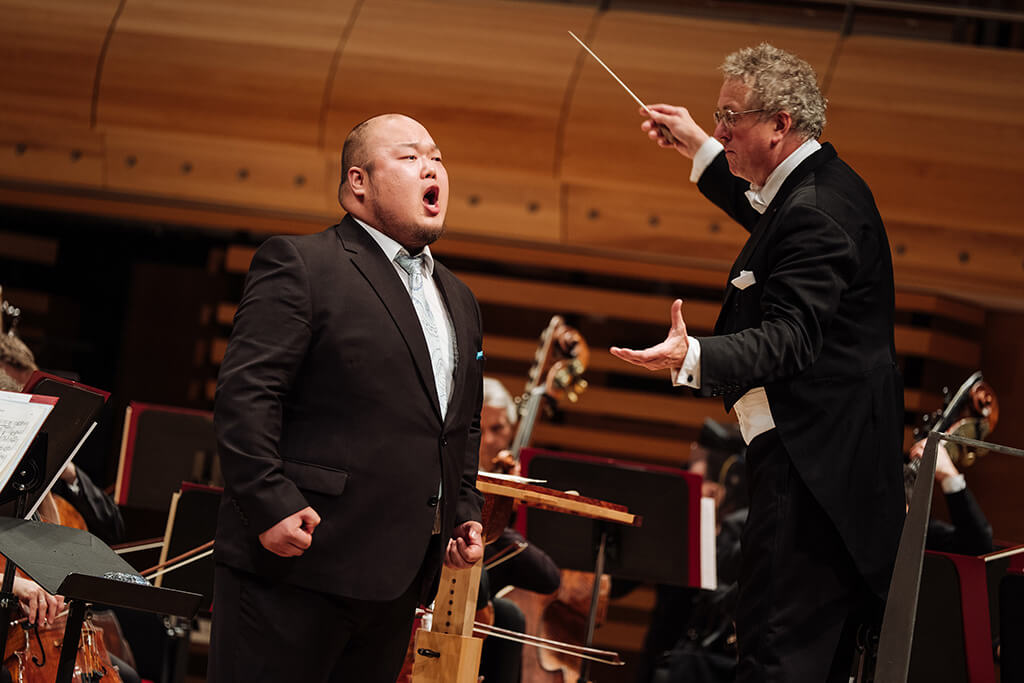
Now that Chant 2018 is history, having drawn to a glorious close with the Grand Finals on Thursday evening, it’s a good time to reflect on the event. As a keen observer of vocal competitions over the last few decades and having attended quite a few in person plus listening from afar, I must say Chant 2018 ranks as one of the more memorable ones for a variety of reasons.
First and foremost, the overall quality of singing was extremely high, arguably the highest in CMIM history. The thirty-eight candidates were chosen from over four hundred applicants from fifty-two countries – they were the proverbial cream of the crop. Another distinction was the addition of an art song component, a first for CMIM, thanks to the good work of James Norcop who was instrumental in raising the funds needed for this initiative. Speaking of funds, at a phenomenal $270,000 CDN, it was the richest coffer for a voice competition in the world.
Remarkable was the skewed gender and voice category gaps of this Competition. If there’s a shortage of fine tenors, you’d never have guessed, with tenors making up half the finalists. Also unusual was the absence of sopranos among the final six, not to mention five men and one woman! But musically speaking, no matter how you slice it, this was an excellent competition. There were a few surprises along the way to be sure, but more about that later.
It was a fine turn out at the Maison Symphonique. The proceedings began with a moment of poignancy, a musical tribute to the beloved and recently departed André Bourbeau, a great patron of CMIM, its president and co-founder. Quebec cellist Stéphane Tétreault played an exquisite rendition of Meditation from Thaïs, with the Orchestre symphonique de Montréal under the baton of Graeme Jenkins.

The first singer was Canadian mezzo Emily D’Angelo, whose voice is very familiar to those of us from Toronto. A former member of the COC Ensemble Studio, she will return as Dorabella in Cosi fan tutte this coming season. She combines an engaging stage persona with a gleaming high mezzo, plus a dramatic flair that makes her a director’s dream. She began with a scintillating Una voce poco fa from Barbiere, followed by a poignant Erika’s Why Must Winter Come So Soon? from Samuel Barber’s Vanessa. The Cendrillon aria showcased the lovely sheen to her tone, and she concluded with a resplendent Composer’s Aria from Ariadne auf Naxos.
Up next was another rising star, Canadian tenor Andrew Haji. The order of presentation was changed from the original program. Now he started with a dulcet-toned Una furtiva lagrima from L’Elisir d’amore. Several tenors sang this in the Competition, but Haji’s was my favourite, combining sweet, elegant tone with hall-filling power. His Che gelida manina from La bohème was equally fine, complete with a good high C. An intelligent artist who pays attention to the text, his aria from Mendelssohn’s Elijah showed off his plangent tone and clear diction. To my ears, Haji’s diction is arguably the best among the competitors. Whether it’s German, English, or Italian, you can understand every word. He followed the solemn oratorio with a light hearted, humorous rendition of La donna e mobile from Rigoletto, bringing the house down.
To my ears, the surprise was Korean tenor Konstantin Lee. A last-minute replacement due to a withdrawal, he did extremely well. His singing was marked by Italianate tone, excellent parlando, and technical security. One did notice that he tended to push his compact sized voice, and his dramatic expressions were rather generalized, characterized by stock gestures. He started off with Ah! Leve-toi soleil from Romeo et Juliette, with an impressive diminuendo. His Federico’s Lament showed off a nice timbre. He chose to sing the interpolated high B, which garnered him huge applause. His Alfredo’s aria from La traviata included the cabaletta, well sung with an impressive high C. That said, stylistically it was just a bit too close to verismo for my taste.
American baritone John Brancy was up next, with a low key, introspective aria from Castor et Pollux, sung with smooth, even tone and admirable legato. There is an inherent fast vibrato to his lyric baritone, one bordering on a tremolo, but he intelligently uses it to enhance his expressivity. This was followed by Yeletsky’s Ja vas lyublyu from Pique Dame, His lyric baritone is soft-grained and ingratiatingly warm, not a lot of squillo but always affecting. To my ears, the highlight was his tour-de-force rendition of the Death of Rodrigo from Don Carlos, holding the stage beautifully and singing affectingly.

The third tenor of the evening was another Korean, tenor Mario Bahg. With this singer, it’s all prima la voce, but don’t expect any dramatic revelations from him. He basically stands and sing, but with such a terrific voice, it’s good enough for a lot of opera fans. His Il mio tesoro from Don Giovanni showed off his phenomenally long breath-line. He also had very clear Italian diction. His Salut demeure from Faust was characterized by caressing tone, capped by a very nice diminuendo high C, quite a feat! He ended with Alfredo’s Lunge da lei from La traviata, including the cabaletta with another C. Well, Mr. Bahg had an endless supply of money notes last evening!
The last person to sing was Russian bass Mikhail Golovushkin, who offered a vivid rendition of the bass aria from the Bizet rarity La jolie fille de Perth. Then came Filipo’s Ella giammai m’amo from Don Carlos, a calling card for any Verdian bass. He sang with plenty of gravitas, appropriately he was the oldest competitor, making the 35-year-old cutoff by a couple of weeks! To be sure, bass voices mature later, but at his relatively young age, he already shows a fully mature voice. Tall and handsome, he also looks believable in typical bass roles the likes of fathers, kings and the devil. He concluded with an aria from Prince Igor, sung with sturdy tone and vivid drama.
After all the singing, the jury retired to deliberate for about half an hour. The audience returned to the auditorium to hear the announcements. The result from the earlier Art Song Finals was also announced at the same time.
My final thoughts? Sincere congratulations to all the prize winners – they are all deserving to be in the winner’s circle. When it comes to the arts, we all have our individual preferences. I, for one, agree with most, but not all, of the juries’ decisions. I feel a strong sense of disappointment that Andrew Haji and Gemma Summerfield did not rank in the aria and art song divisions respectively.
Going further back to the First Round, I have to say I was completely floored that Swedish soprano Christina Nilsson did not advance to the Semi-finals. But such is the vagaries of competitions, so much of it has to do with time and chance, and the juries’ preferences. I totally agree with James Norcop, who said when I interviewed with him that any singer should considered having won, just having been chosen to compete in CMIM. Competitions can only make you better, motivate you to hone your craft. The experience gained from having participated can only lead to further growth of one’s artistry. My congratulations to all!
Results
Song Division:
‘Léopold Simoneau’ First Prize $30,000 – offered by the John R. Stratton Trust. The First Prize also comes with the James Norcop Career Development Grant ($50,000) and a Residency offered by the Banff Centre for Arts & Creativity ($2,500). Winner: John Brancy (USA), baritone.
‘Maureen Forrester’ Second Prize $15,000 – offered by Colleen Sexsmith. Winner: Julien Van Mellaerts (New Zealand – United Kingdom), baritone
‘Lois Marshall’ Third Prize $10,000 – offered in memory of Dr. Clive Mortimer. Winner: Clara Osowski (United States), mezzo-soprano
French Mélodie Award, $5,000 – offered by Diane Loeb. Winner: John Brancy (United States), baritone
German Lied Award $5,000 – offered by Arija and Clarence Stiver. Winner: Julien Van Mellaerts (New Zealand – United Kingdom), baritone
‘John Newmark’ Best Collaborative Pianist Award $10,000 offered by Richard Lupien. Winner: João Araujo (Portugal)
OFQJ 50th Award $5,000 – offered by the Office Franco-Québécois de la Jeunesse. Winner: Magali Simard- Galdes (Canada), soprano
Best Canadian Artist Award $3,000 – offered by the Bourbeau Foundation. Winner: Rihab Chaieb (Canada – Tunisia), mezzo-soprano
Radio-Canada People’s Choice Award $3,000. Winner: Clara Osowski (United States), mezzo-soprano
Aria Division:
First Prize, $30,000 – offered by the City of Montréal. The First Prize also comes with the Joseph Rouleau Career Development Grant ($50,000), offered by the Azrieli Foundation, and a Residency offered by the Banff Centre for Arts & Creativity ($2,500). Winner: Mario Bahg (South Korea), tenor
‘Pierre Péladeau and Raymonde Chopin’ Second Prize $15,000 – offered by Québecor. Winner: Emily D’Angelo (Canada – Italy), mezzo-soprano
Third Prize $10,000 – offered by Stingray Classica. Winner: Konstantin Lee (South Korea), tenor
Opera Aria Award $5,000 – offered by the Opéra de Montréal. Winner: Mario Bahg (South Korea), tenor
Oratorio Award $5,000 – offered by Aéroports de Montréal Winner: Andrew Haji (Canada), tenor
Radio-Canada People’s Choice Award $3,000 Winner: Emily D’Angelo (Canada – Italy), mezzo-soprano
Best Canadian Artist Award $3,000 – offered by the Bourbeau Foundation. Winner: Emily D’Angelo (Canada – Italy), mezzo-soprano
The four non-qualifying finalists in the Art Song and Aria divisions will each receive a $2,000 grant generously offered by Maurice Deschamps, Peter & Hélène Hunt, Joseph Rouleau, and Peter Symcox. Winners: Gemma Summerfield (United Kingdom), soprano – Art Song; Andrew Haji (Canada), tenor – Aria; John Brancy (United States), baritone; – Aria; Mikhail Golovushkin (Russia), bass – Aria
ALSO READ:
CHOIX DE LA RÉDACTION | Huit concerts remarquables à mettre à votre agenda cette semaine
- OPÉRA | Dix productions du Metropolitan Opera dans un cinéma près de chez vous cette saison - 24 septembre 2019
- CMIM 2018 | Great Voices and Some Surprises Make An Exciting Finish - 10 juin 2018
- CMIM 2018 | Six Singers Move On To Aria Finals - 6 juin 2018



